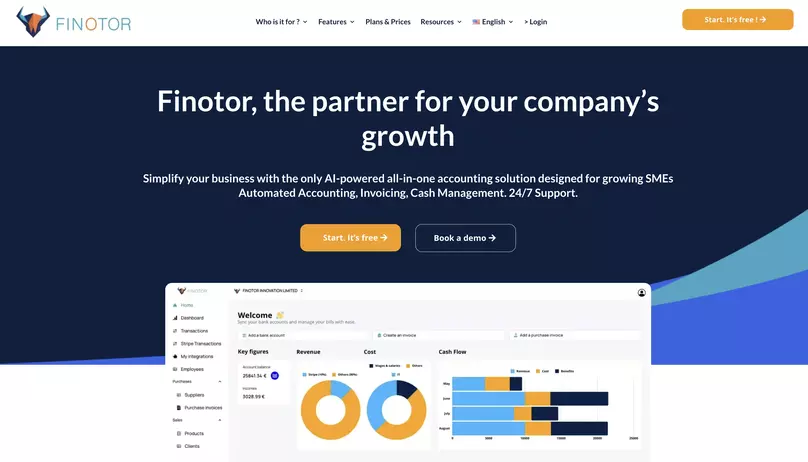Contents
- 1 What You’ll Learn from This Guide:
- 2 How Finotor’s Accounting Solutions Can Help Manage Your Business Auto Loan
- 3 Types of Business Auto Loans
- 4 How to Qualify for a Business Auto Loan
- 5 Steps to Apply for a Business Auto Loan
- 6 Business Auto Loan Rates and Terms
- 7 Tax Benefits of Business Auto Loans
- 8 Regional Considerations for Business Auto Loans
- 9 Common Mistakes to Avoid
Benefits of Small Business Auto Loans
As a small business owner, managing transportation needs is crucial for ensuring smooth operations and maintaining customer satisfaction. For small businesses and companies, whether it’s a delivery truck, company car, or a fleet of vehicles, having reliable transportation is often essential to success. That’s where a business auto loan comes into play. This guide will walk you through what business auto loans are, how they work, and why they could be a valuable financial tool for your small business.
Finotor is designed to help small businesses improve their accounting and financial management by offering an AI-powered system for daily bookkeeping tasks. This means when you apply for an auto loan to purchase a new van or car, your chances of approval increase due to organized and accurate documentation. Finotor also offers personalized, professional, human support to guide you through using Finotor, the best accounting and finance management and improvement platform. So if you manage to secure your business auto loan, you’ll be able to manage your loan professionally and more efficiently. Feel free to reach out to our team here with any business, accounting or finance questions—starting a conversation is completely free.
What You’ll Learn from This Guide:
- Understanding Business Auto Loans: Learn what a business auto loan is and how it differs from personal auto loans.
- Key Features and Benefits: Discover the main features, such as loan terms, interest rates, and potential tax benefits.
- How to Qualify and Apply: Understand the qualification process and the steps to apply for a business auto loan.
- Regional Considerations: Explore how business auto loans differ in regions like the USA, Europe, Australia, and South Asia.
- Finotor’s Role: Find out how Finotor’s accounting solutions can help manage your business auto loan.
- Alternatives to Business Auto Loans: Learn about other financing options such as leasing, equipment financing, and business lines of credit.
- FAQs: Get answers to common questions about business auto loans for small businesses.
What Is a Business Auto Loan?
A business auto loan is a type of financing designed specifically for organizations purchasing vehicles used for business purposes. These loans provide small businesses with the capital needed to buy new or used vehicles, ranging from small cars to large trucks, without needing to pay the full price upfront. By providing necessary capital, business auto loans support the development of small businesses, facilitating growth and expansion.
Unlike personal auto loans, business auto loans are tied to owning the business itself. This means that repayment and ownership responsibilities lie with the business entity, not the individual owner. Depending on the lender, these loans may also include tax benefits and flexible terms tailored to meet the needs of small businesses.
Finotor, an all-in-one accounting technology solution, simplifies tracking and managing these loans, ensuring your business stays on top of payments and maximizes tax benefits.
Key Features of a Business Auto Loan
- Loan Amounts and Terms: Business auto loans typically cover 80-100% of the vehicle’s cost, depending on the lender and your business’s creditworthiness. Repayment terms often range from 2 to 7 years, allowing businesses to choose a plan that suits their cash flow needs.
- Interest Rates: Interest rates vary based on your business’s credit score, financial health, and the lender’s terms. Rates are generally competitive, especially if the loan is secured by the vehicle itself.
- Collateral: The vehicle being purchased typically serves as collateral, meaning lenders can repossess it if the loan is not repaid.
- Tax Benefits: Small businesses may be eligible for tax deductions on loan interest and depreciation of the vehicle, providing additional financial advantages.
How Finotor’s Accounting Solutions Can Help Manage Your Business Auto Loan
Managing a business auto loan can be complex, involving multiple financial factors such as interest rates, monthly payments, tax benefits, and depreciation. This is where Finotor’s all-in-one accounting solutions provide significant value to small businesses. Here’s how Finotor can streamline the process and enhance financial management and small business administration:
- Simplified Loan Tracking: Finotor enables small businesses to track loan balances, payment schedules, and interest rates in real time, ensuring accuracy and transparency.
- Integrated Financial Reporting: Finotor provides comprehensive reports that reflect the impact of the loan on cash flow, profit margins, and overall financial health. This helps in making informed business decisions.
- Tax Benefit Calculations: Finotor automates the calculation of tax deductions related to loan interest and vehicle depreciation, reducing manual effort and potential errors.
- Cash Flow Management: Finotor helps businesses project future cash flows based on loan repayment schedules, aiding in efficient budgeting and resource allocation.
- Document Management: Finotor organizes and stores essential documents such as loan agreements, financial statements, and tax returns, ensuring they are easily accessible when needed.
- Credit Monitoring and Improvement: Finotor tracks credit improvements and provides insights into credit health, which is critical for securing favorable terms on future loans.
- Scenario Analysis: Finotor allows businesses to run various financial scenarios to understand potential impacts, such as adjusting loan terms or planning for additional vehicle purchases.
- Time and Cost Efficiency: By automating complex accounting tasks, Finotor significantly reduces the time spent on manual bookkeeping and accounting processes. This time savings translates into lower operational costs and more resources to focus on core business activities.
By leveraging Finotor’s powerful accounting tools, businesses can at low cost, simplify the management of their auto loans and gain deeper insights into their financial performance, setting the stage for sustainable growth and stability.
Benefits of a Business Auto Loan
- Preserve Cash Flow: Instead of depleting cash reserves for a large vehicle purchase, a business auto loan allows you to make manageable monthly payments over time.
- Build Business Credit: Successfully managing a business auto loan can help establish or improve your business credit profile.
- Expand Operations: Reliable transportation can enhance productivity and support business growth. It can also lead to job creation by enabling businesses to expand their operations and hire more employees.
- Flexible Options: Various loan products allow businesses to choose terms and conditions that best suit their financial goals.
Types of Business Auto Loans
When it comes to financing vehicles for your company, understanding the different types of business auto loans available can help you make an informed decision that best suits your needs. Here are the primary types of business auto loans:
- Term Loans: These are straightforward loans where you receive a lump sum of money to purchase a vehicle. Repayment terms typically range from 3 to 7 years, allowing you to spread out the cost over time. This option is ideal for businesses looking to own their vehicles outright.
- Line of Credit: A revolving line of credit provides flexibility, allowing you to draw funds as needed to purchase a vehicle. Repayment terms are based on the outstanding balance, making it a versatile option for businesses that may need to finance multiple vehicles over time.
- Leasing: Leasing allows businesses to use a vehicle for a set period, usually 2 to 5 years, with the option to purchase the vehicle at the end of the lease term. This can be a cost-effective way to access newer models without the commitment of ownership.
- Equipment Financing: Specifically designed for purchasing specialized equipment, such as trucks or construction vehicles, this type of loan uses the vehicle itself as collateral. It’s a great option for businesses that need specific types of vehicles to operate efficiently.
By understanding these options, small businesses can choose the type of loan that best aligns with their financial situation and operational needs, ensuring they get the most value for their money.
How to Qualify for a Business Auto Loan
Lenders evaluate several factors before approving a business auto loan. Understanding these requirements can help you prepare a strong application:
- Business Credit Score: A solid business credit score demonstrates reliability.
- Time in Business: Lenders often prefer businesses that have been operational for at least 1-2 years.
- Revenue and Financial Stability: Financial statements, tax returns, and proof of revenue help lenders assess your business’s ability to repay the loan.
- Down Payment: A larger down payment can reduce monthly installments and improve approval odds.
- Personal Credit Score (if required): For newer businesses, lenders may consider the owner’s personal creditworthiness.
Steps to Apply for a Business Auto Loan
- Determine Your Needs: Identify the type of vehicle(s) you need and calculate the approximate cost.
- Research Lenders: Compare offers from banks, credit unions, online lenders, and specialized financial institutions.
- Prepare Documentation: Gather essential documents, including business registration, financial statements, and proof of revenue.
- Submit Your Application: Complete the application process with your chosen lender.
- Review and Accept Terms: Carefully review the loan terms before accepting.
- Purchase the Vehicle: Use the loan proceeds to buy the vehicle.
Business Auto Loan Rates and Terms
Navigating the rates and terms of business auto loans can be complex, but having a clear understanding can help you secure the best deal for your company. Here are some general guidelines to keep in mind:
- Interest Rates: Business auto loan interest rates typically range from 5% to 20% APR. The exact rate you receive will depend on factors such as your business’s creditworthiness, the type of loan, and the lender’s policies. Businesses with strong credit profiles often secure more favorable rates.
- Repayment Terms: Repayment terms for business auto loans generally span from 3 to 7 years. The length of the term can affect your monthly payments and overall interest costs, so it’s important to choose a term that aligns with your business’s cash flow and financial planning.
- Down Payment: Most lenders require a down payment, usually between 10% and 20% of the vehicle’s purchase price. A larger down payment can reduce your monthly payments and may improve your chances of loan approval.
- Fees: Be aware of potential fees associated with the loan, such as origination fees, documentation fees, and late payment fees. These can add to the overall cost of the loan, so it’s important to factor them into your budget.
By understanding these key elements, small businesses can better navigate the loan process and secure terms that support their financial health and growth.
Tax Benefits of Business Auto Loans
One of the significant advantages of business auto loans is the potential tax benefits they offer. Here are some of the key tax advantages that small businesses can leverage:
- Deductible Interest: The interest paid on a business auto loan can often be deducted as a business expense on your company’s tax return. This can reduce your taxable income and lower your overall tax liability.
- Depreciation: Vehicles purchased for business use can be depreciated over time, providing a tax deduction each year. This allows businesses to recover the cost of the vehicle gradually, easing the financial burden.
- Section 179 Deduction: Under Section 179 of the IRS tax code, businesses can deduct the full purchase price of qualifying vehicles in the first year, up to a certain limit. This can provide a substantial tax benefit, especially for businesses that need to invest in multiple vehicles.
By taking advantage of these tax benefits, small businesses can reduce the overall cost of their business auto loans and improve their financial position.
Regional Considerations for Business Auto Loans
United States
In the U.S., small businesses have access to various lenders, including major national banks and online financial institutions. Loan terms typically range from 2 to 7 years, with competitive interest rates influenced by the Federal Reserve’s policies. Examples include 36-month terms for smaller purchases or 60- to 72-month terms for larger vehicles. U.S. small businesses benefit from a wide range of financing options and flexible repayment plans.
Europe (UK, France, Ireland)
In Europe, the process can vary by country:
- UK: Loans often feature flexible terms, typically ranging from 24 to 60 months, and lower interest rates due to a competitive lending market.
- France: Lenders may emphasize business stability and require detailed financial documentation, with terms often ranging from 36 to 48 months.
- Ireland: Terms are generally shorter, such as 24 to 36 months, with higher interest rates compared to the UK.
Australia
Business auto loans in Australia are influenced by the Reserve Bank of Australia’s policies. Major lenders include ANZ and Commonwealth Bank. Interest rates and terms are similar to those in the U.S., with typical terms ranging from 24 months for smaller vehicles to 60 months for fleet purchases. Options are available for both new and used vehicle financing.
South Asia (India as an Example)
In India, business auto loans often have higher interest rates due to local economic conditions. Major lenders include State Bank of India (SBI) and HDFC Bank, offering terms that typically range from 3 to 5 years. For larger fleet expansions, terms may extend to 48 or 60 months. Indian lenders also require substantial financial documentation and may focus on the business’s revenue stability.
Funding Alternatives to Business Auto Loans
- Leasing: Allows use without ownership; Finotor tracks payments and compares costs.
- Equipment Financing: Uses the vehicle as collateral; Finotor integrates this into financial planning.
- Personal Auto Loans: For sole proprietors; Finotor separates personal and business finances.
- Business Line of Credit: Flexible funding for various purposes; Finotor tracks usage and repayment.
- Commercial Vehicle Leasing Programs: Tailored packages from manufacturers; Finotor analyzes costs and benefits.
Different financing options can help small businesses access new markets and expand their customer base.
Common Mistakes to Avoid
Applying for a business auto loan can be a complex process, and there are several common mistakes that businesses should avoid to ensure a smooth experience:
- Not Checking Credit: Before applying for a loan, it’s crucial to check your business’s credit score. A low credit score can result in higher interest rates or even loan denial. Taking steps to improve your credit score beforehand can lead to better loan terms.
- Not Providing Adequate Documentation: Lenders require comprehensive documentation, such as financial statements and tax returns, to assess your business’s financial health. Failing to provide these documents can delay the approval process or result in a denial.
- Not Shopping Around: Different lenders offer varying terms and interest rates. Failing to shop around and compare offers can result in less favorable loan conditions. It’s important to explore multiple options to find the best deal for your business.
- Not Reading the Fine Print: Loan agreements can contain hidden fees and penalties. It’s essential to read the fine print and understand all the terms and conditions before signing. This can prevent unexpected costs and ensure you’re fully aware of your obligations.
By avoiding these common mistakes, businesses can improve their chances of securing a favorable business auto loan and ensure a smoother, more efficient application process.
Top Tips for Securing a Business Auto Loan
- Improve Your Business Credit: Use Finotor’s credit monitoring tools.
- Shop Around: Compare lenders with Finotor’s side-by-side comparison.
- Negotiate Terms: Back negotiations with Finotor’s financial analysis.
- Consider Preapproval: Finotor helps streamline the preapproval process.
- Analyze Costs: Finotor offers comprehensive cost analyses.
Finotor’s Here to Support
Contact us now to discover how we can assist your business in achieving financial success and optimization. Don’t hesitate to ask any questions related to accounting or finance—we’re here to help, and speaking with our team is completely free. Regardless of your business size, we’re happy to offer support. Additionally, if you’re interested in Finotor and know other business owners, you can benefit from our referral program, which provides a discount on your Finotor subscription.
FAQs About Business Auto Loans for Small Businesses
1. What is a business auto loan, and how does it benefit small businesses?
A business auto loan is a financing option designed for purchasing vehicles used for business purposes. It benefits small businesses by preserving cash flow, offering potential tax deductions, and helping to grow and build business credit.
2. How do I qualify for a business auto loan as a small business owner?
To qualify for a business auto loan, lenders typically consider your business credit score, time in business, revenue stability, and, in some cases, the owner’s personal credit score.
3. What are the interest rates for business auto loans for small businesses?
Interest rates for business auto loans vary based on your business credit score, financial health, and the lender’s terms. Small businesses with more assets and stronger credit profiles often secure more favorable rates.
4. Can I get a business auto loan for a used vehicle?
Yes, many lenders offer business auto loans for both new and used vehicles, making it a flexible option for small businesses and entrepreneurs looking to expand their fleet cost-effectively.
5. What is the typical repayment term for a business auto loan?
Repayment terms for business auto loans generally range from 2 to 7 years, allowing small businesses to select a term that aligns with their cash flow and financial planning.
6. Are there tax benefits for employees of small businesses taking out a business auto loan?
Yes, small businesses may be eligible for tax deductions on loan interest and vehicle depreciation, helping reduce the overall cost of the loan.
7. How does Finotor help manage business auto loans for small businesses?
Finotor provides comprehensive accounting solutions that track loan payments, file due, calculate tax benefits, and offer financial reports to ensure your small business manages its auto loans efficiently.
8. What are some alternatives to business auto loans for small businesses?
Alternatives include leasing, equipment financing, and business lines of credit. Each option has unique advantages, and Finotor can help you analyze these alternatives to find the best fit for your small business.
9. Can startups get business auto loans, or do lenders prefer established businesses?
While established businesses may have an easier time qualifying, startups can still get business auto loans, especially if they have strong personal credit or provide a substantial down payment.
10. How do business auto loans differ in various regions like the USA, Australia, and South Asia?
Business auto loan terms, interest rates, and lender requirements can vary by region due to local economic conditions and government regulations. For example, interest rates may be higher in South Asia compared to the USA or Australia.
11. What are the key benefits of a business auto loan for small businesses?
A business auto loan allows small businesses to get money to acquire necessary vehicles without a large upfront cost, preserving cash flow. It also helps in building business credit, offers potential tax deductions, and provides the flexibility to choose repayment terms that align with the business’s financial situation.









